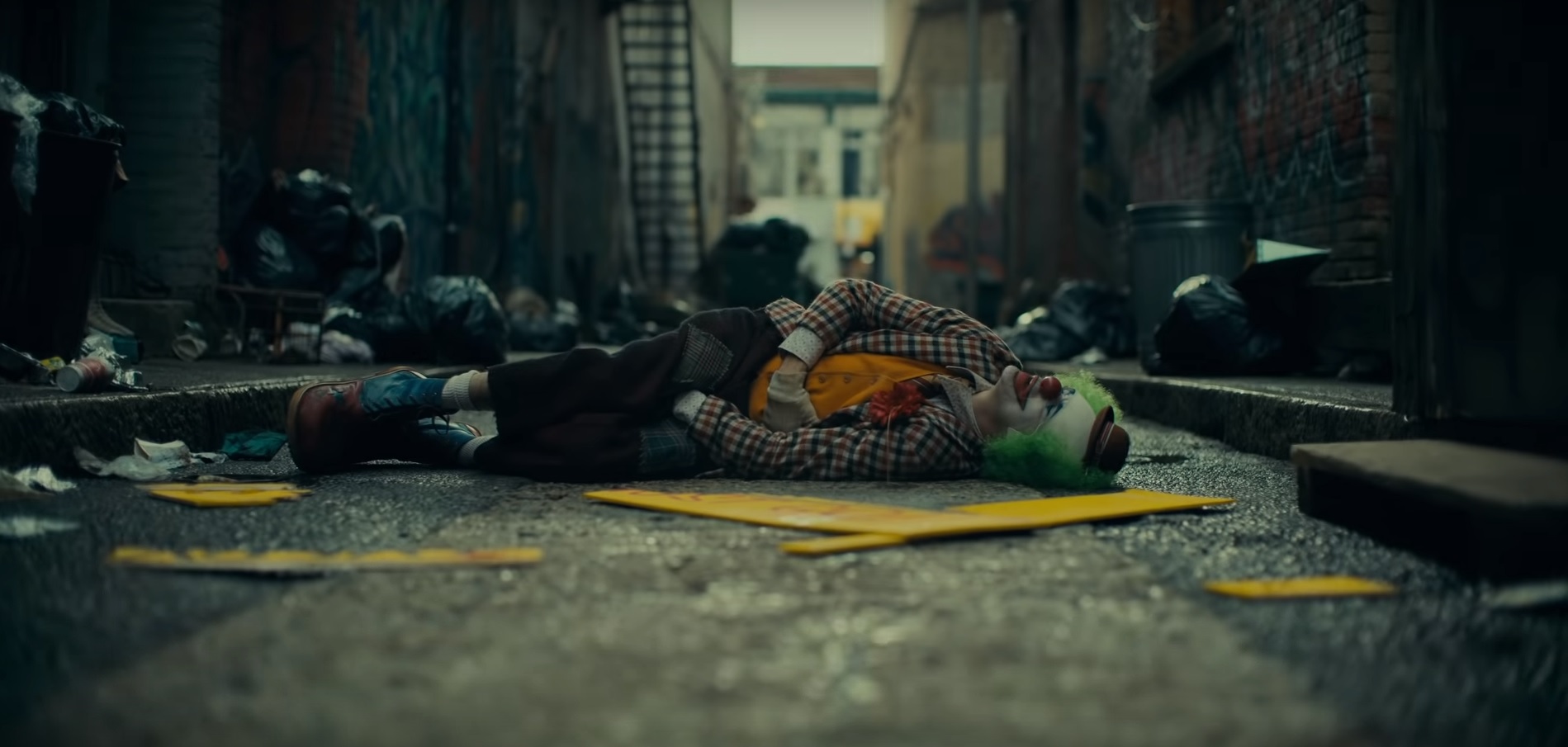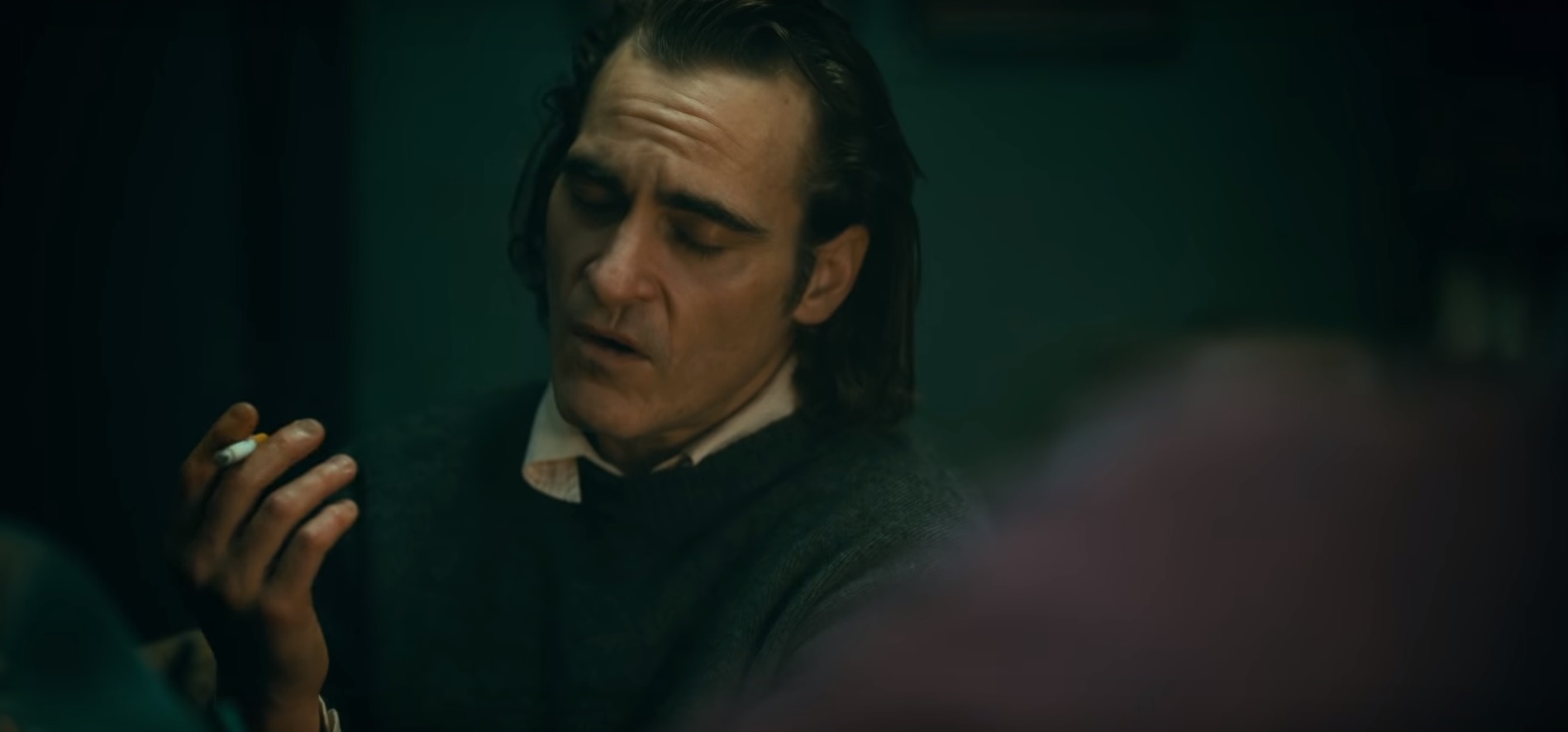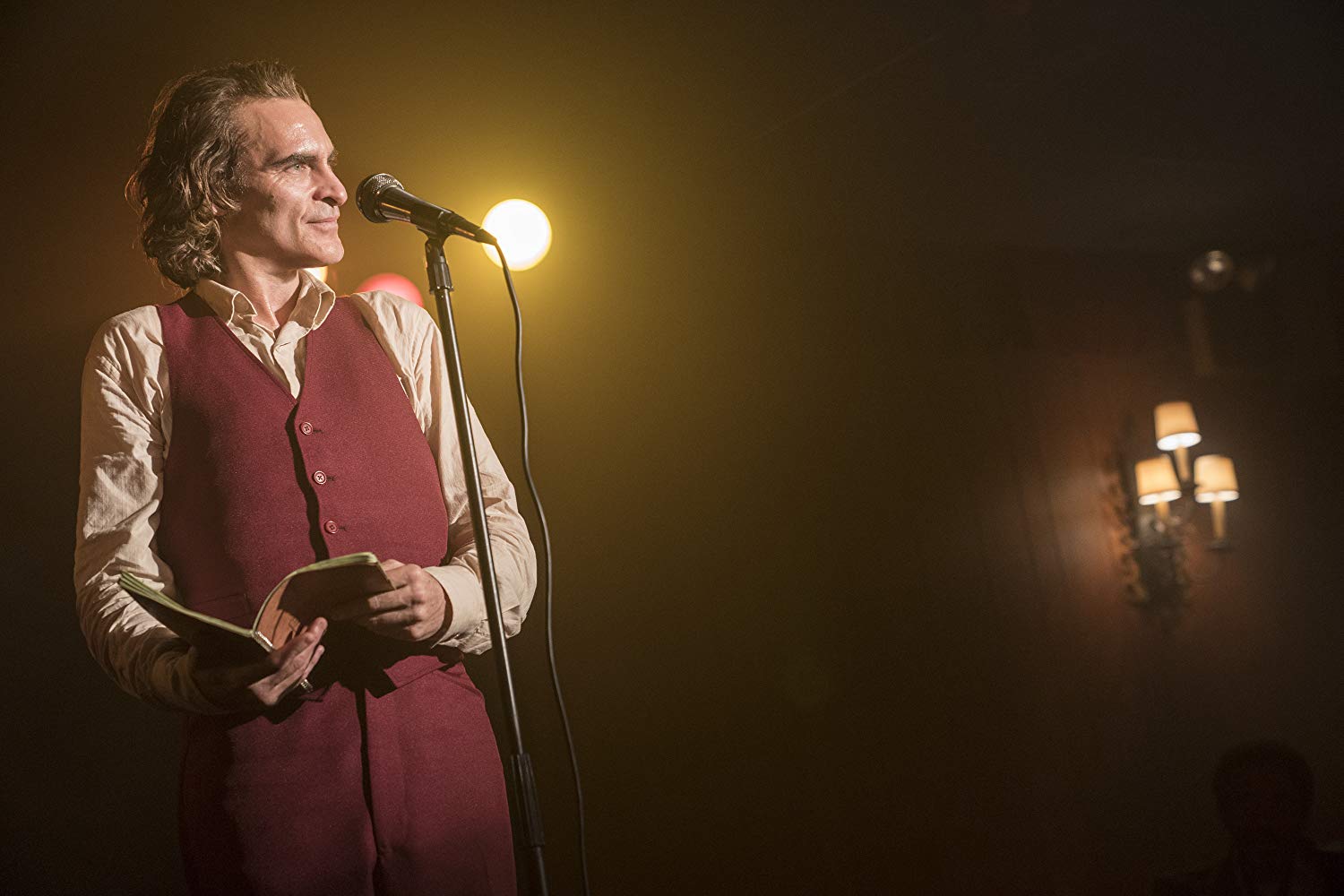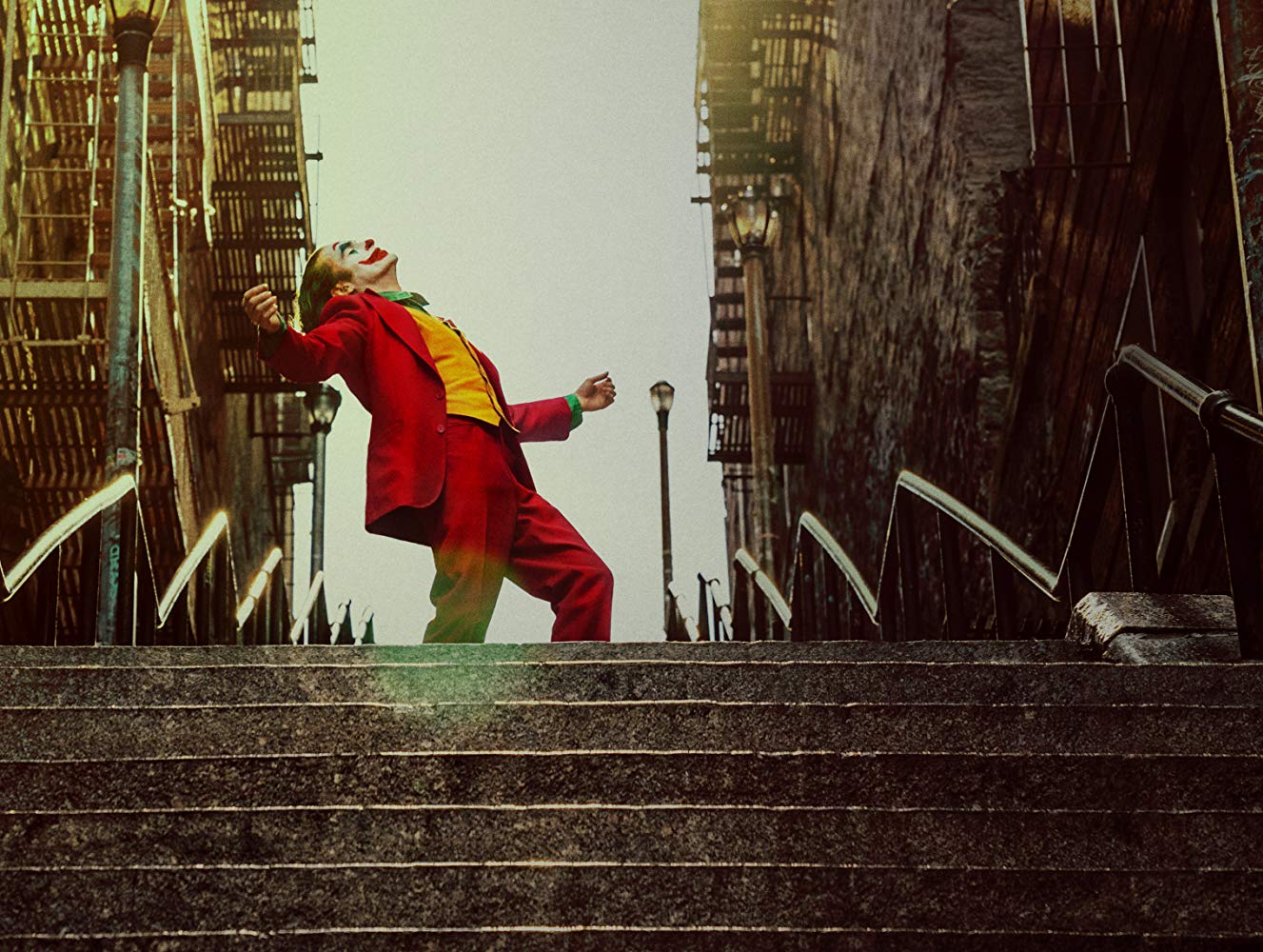Phoenix’s Joker isn’t that guy. When we first meet Arthur Fleck in Todd Phillips’ Joker, he’s in his clown makeup, looking himself in a mirror, stretching his lips wide to force a smile, eyes wet with tears. You feel a thick cloud of sadness hovering above your head in the theatre hall. We then see Arthur in his full clown getup carrying a sign and doing a goofy dance outside a shop. The jazzy tunes of the piano tell us when the film is set in: The 80s. A bunch of teenage punks jack the signage from his hands and bolt. He chases. He’s then beaten up by those kids in a dingy alley. The sounds of the piano are heard no more, replaced by a synth score that invokes a sense of sorrow. As he lays on the ground in pain, with tears flowing down his eyes, in the middle of black garbage bags and overflowing trash cans, wondering why life keeps screwing him in the ass, the camera gently, like a ballerina on her tippy toes, pulls back and the words JOKER occupies the entirety of the screen. The imagery is superb (Lawrence Sher’s cinematography is worth basking in, in IMAX). With his opening scenes, Todd Phillips sets the stage perfectly. My grandmother once told me that films should always aspire to make people feel happy and jubilant. This film isn’t for her. Joker is a joyless and dour character study, melancholic, heartbreaking but always absorbing. It’s a wonderfully written, superbly crafted, unnerving and frankly uncomfortable telling of a sad man. A broken man with a deeply tortured soul. A literal clown (he works at a company called ‘Hahas’) suffering from severe depression and who tries to justify — and perhaps understand — his mental instability by pointing towards the escalating volatility of Gotham City.
“Is it just me, or is the world getting crazier out there?” Arthur asks his therapist, after taking a puff of his cigarette — he always has a cigarette in hand. She isn’t the kind of therapist rich people go to with their fancy air-conditioned offices and vases full of flowers, either. She’s a social worker, whose tiny office is cramped and messy. Arthur talks about always having negative thoughts. He has a notebook (a lot of its content blurred by our prudish censor board) with words that read: “I just hope my death makes more cents than my life.” I felt my stomach quiver more than a little. If Ledger’s Joker is comparable to Darth Vader, then Phoenix’s is like Travis Bickle from Taxi Driver (the film Todd Phillips drew inspiration from) or one of the many damaged men you’ll find in a Martin Scorsese classic. Arthur’s life is one full of misery and with each passing moment, he finds it more and more difficult to deal with the demons that haunt him from the inside and out. He’s imploding. Everywhere he goes, shit keeps getting thrown at him — his boss, his colleagues, the random lady on the bus and Murray Franklin (Robert DeNiro), a talk show host who pokes fun at him on TV. But none of it is his fault (or so he believes), it’s the people out there that are the problem. It’s filthy Gotham City that’s the problem. A city that cares not for clowns and the downtrodden. Joker is set against the backdrop of class conflict, during what appears to be the most unstable period of Gotham City, at least in this story. We see Thomas Wayne, the richest, most influential man in the city, label the underprivileged as clowns, we see riots in front of political buildings. We see poverty-stricken citizens living in rundown apartments with constantly-breaking-down elevators.
Arthur’s walks home from work and from therapy are agonizing. We see him drag his heavy feet with his head down and back hunched, slowly, through long stretches of the street and up a tall flight of stairs that’s seemingly never-ending. Todd Phillips frames these scenes in a manner that we don’t just feel the weight of the world on his shoulders, we feel it on ours too. The shit that gets thrown at him doesn’t just stop once he’s at home. Oh, there’s more waiting for him there too. There’s a purposefully cringy scene where Arthur tells his mom he wants to be a stand-up comedian, to which his mother (the solid Frances Conroy) replies, “Don’t you have to be funny to be a stand-up comedian?” Ironic, considering it’s his mother who nicknamed him Happy and who told him that his purpose in life is to spread happiness and joy. But Arthur doesn’t want to be a stand-up comedian because he genuinely believes that’s his purpose in life (though, he thinks he does). I think he wants to be up there on stage because he craves attention. Nay, he’s desperate for it. Desperate to be noticed. Desperate for adulation. He thinks he’s invisible. Nobody notices him. Well, nobody except his beautiful neighbour down the aisle. I’ve read some criticisms about the use (or underutilisation) of Zazie Beetz’ character. My argument is that she isn’t supposed to be a character, per se, rather an innocent presence in his life (think Sharon Tate in Once Upon a Time in Hollywood). A beautiful single mom whose pearly white smile will melt even the coldest of hearts. She’s a glimmering star in the ugly and unflinching underbellies of Gotham City.
She’s also the only one who understands Arthur, laughs at his jokes and finds his stalker-ish behaviour sexually attractive. Sometimes her behaviour comes off as odd, but there’s more to her story, both shocking and makes perfect sense. Screenwriter Scott Silver’s (The Fighter) character writing is nuanced. Think about the scene where Arthur kills someone for the first time. At first, he does it simply in self-defence. But his accidental murder gives him a sweet taste of power — a power he never knew he craved for his entire life. It reminded me of domesticated dogs that get a lick of raw, bloody meat for the first time. It’s also after the fact that Arthur is immediately accompanied by an epic score and gets his first sexual release. What does that tell us about the kind of person he is becoming? As the film progresses, Arthur becomes more and more unhinged, his humanity slowly fades away with his mind. But he relishes it. Phoenix (Her, The Master) infuses just enough intoxicating charisma, likeability and then swagger into a very unlikeable character that we always empathise with him, even if we don’t agree with him. Phoenix who shed 25kgs for the role looks like a frail man, whose rib cages can be seen to a frightening degree, especially when he stretches on the couch. But that isn’t the most impressive part (though it is very impressive), it’s his ability to give you a peek at Arthur’s at times contradicting and convoluted thoughts and emotions through movement and body language that’s the true testament of his skill. To steal the title of a Dave Eggers book, here — and as always — Joaquin Phoenix delivers a heartbreaking performance of staggering genius that anchors the whole film. By the end of it, I was inebriated off his craft.
But it isn’t just the writing and performance that makes this film work. It’s Todd Phillips’ terrific direction. Consider this wonderfully staged scene. Arthur Fleck is outside Wayne Manor. In front of him is a tall gate made of iron bars. On the other side, 10-year-old Bruce Wayne. The poor on one side, the rich on the other. Here, Todd Phillips has taken the idea of Joker vs Batman and elevated it to represent the strife between the upper class and the lower. (But, I’ll stop kidding myself with the analysis. The scene made my heart do 10 backflips like the geeky little kid I am. We know, but the characters don’t, that this will not be the last time Joker and Bruce Wayne meet face to face. Go Batman!) Phillips drapes the whole film in tints of green, blue, red and dread. Every scene is stunning to behold, every scene will keep you on edge. Notice the sequence where Arthur walks up on stage for his very first open mic. He emerges from the darkness, your heart starts to thump, matching the beat of the drum. You fear something horrific is about to happen. There’s a sense of uneasiness felt throughout the film. Even the music in Joker is used in a unique fashion. Hildur Guðnadóttir’s Han Zimmer-ian score isn’t just deployed to enhance the audience’s experience, they seem to be playing deep inside Arthur’s subconscious. Sometimes, Arthur externalises them by dancing with the graceful flamboyance of a contemporary artiste. They’re art pieces in and of themselves. Then there’s the violence, sprinkled throughout the film to heart-pounding effect. It’s never stylistic, never showy, never cool. It’s messy, chaotic and jagged, just like his mind. It’s also interesting that the most vicious and blood-soaked moment is punctuated by comedy. It’s interesting not because Todd Phillips himself finds em funny — I doubt that he does — but because Arthur Fleck, delusional and deranged, certainly does.
I’ve been told that some parts of the film move a little too slowly. Perhaps. Joker doesn’t always have a clear narrative thread. It doesn’t have an antagonist or an “end goal,” the way other origin stories like Batman Begins and Wonder Woman do. It lacks a sense of gradual escalation of a specific external conflict. But Joker isn’t about the plotting. It’s about the moments, the individual scenes we spend with Arthur Fleck and exploring the inner workings of his deteriorating mind. It’s like we’re reading the journal he so dedicatedly writes on. The journal of a man who starts off wounded and progressively morphs into a delusional cold-blooded killer whose moral compass is vastly different from ours. A man we come to empathise with but rarely feel sympathy for. And the third act of the film? Boy, that’s a different beast entirely. It builds and intensifies towards a magnificent and overwhelming crescendo deserving of applause. The Jesus-like imagery is both unsettling and gloriously hair-raising. Goosebumps! Goosebumps! Just thinking about it sends shivers down my spine. JOKER is outstanding in every sense of the word. It’s one of the best comic book films ever put to screen and an absolutely brazen masterpiece. Joker laughs its way into Malaysian cinemas this 3 October.




